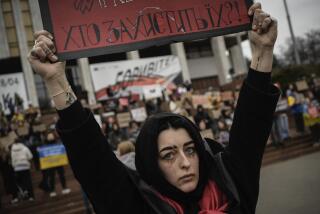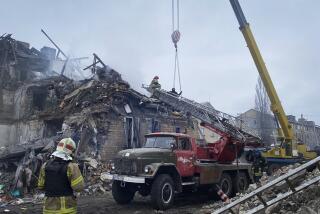As NATO Bombs Fall, Western Disarray Worsens : A few air strikes are no solution to the Balkans war
- Share via
Nato warplanes on Wednesday bombed Serb missile sites in northwest Herzegovina and neighboring Croatia. The NATO action, the third air raid in three days, came as a coordinated assault by Bosnian and Croatian Serbs threatened the destruction of Bihac, a Muslim town in a U.N.-declared “safe area” in northwest Bosnia. The attack was not described as a measure taken in defense of Bihac, however, only as a retaliation for Serb missile attacks on British reconnaissance planes. This was for a clear if regrettable political reason: NATO does not attack except by request of the United Nations, and the world body fears that taking sides would provoke Serb attacks on UNPROFOR, the U.N. peacekeeping force. The British and French, having contributed the largest troop contingents to UNPROFOR (the United States has contributed no troops), counsel restraint both in U.N. and NATO deliberations.
The effect of the restraint, unfortunately, has been neither to rescue Bihac nor to moderate the aggression of the Bosnian Serbs. Bosnian Serb leader Radovan Karadzic has announced that his response to the NATO raids will be “all-out war” and revenge against UNPROFOR. On Wednesday, the Bosnian Serbs ordered U.N. officers at nine weapons-collection sites in Bosnia confined to quarters, presumably to permit the Serbs to reclaim the heavy weapons previously surrendered under threat of NATO air attack.
The U.N. Bosnian mission chief, Yasushi Akashi, claimed Wednesday to have the support of Croatian Serb leader Milan Martic and Serbian President Slobodan Milosevic for a peace agreement of undisclosed terms, but Milosevic’s armed forces are not participating in the assault, and Martic’s forces could easily withdraw across the Croatian border and allow Karadzic’s Bosnian Serbs to finish the assault.
In short, NATO has managed only to make a bad situation worse and seems, dismayingly, to have demonstrated once again its virtual irrelevance in the Balkans war. Unlike the United Nations, NATO clearly does have the wherewithal to intervene decisively, but the political will to take military action is lacking.
No less important, however, than the impending slaughter in Bihac is the far less noticed horror being perpetrated in parts of Bosnia-Herzegovina where no shooting war is under way. Speaking to the House of Commons, British Foreign Secretary Douglas Hurd, clearly referring to the outbreak of fighting around Bihac, said last week, “This setback followed a period during which some signs of normal life returned to Bosnia.” But just a week earlier Human Rights Watch had published a well-documented study charging that “the most savage and institutionalized ‘ethnic cleansing’ today in northern Bosnia is taking place in areas where there is no fighting.”
The report detailed frequent murders and beatings of non-Serbs. “Ethnic cleansing” means that women are terror-raped, men (sometimes women too) are enslaved, Serb soldiers and police are subject to no civilian restraint and even the Serb Red Cross engages in extortion. It is because this is the effective meaning of what Hurd referred to as “a lull in the fighting” that the fighting will inevitably recur. For the Bosnian Muslims, death is the consequence of peace no less than of war. The only question is whether the European powers will continue to ensure that the balance of power remains tipped toward the Serb side even as, in a strange charade, they engage in symbolic air strikes against the side they favor.
U.S. proposals for military escalation now being made to the United Nations by U.S. Ambassador Madeleine Albright and to NATO by other U.S. officials are likely to be rejected, even as Republicans in Congress call for unilateral U.S. action without facing the practical impossibility of U.S. action in Europe without European support. The disarray worsens daily, and, tragically, what is at stake is the survival not just of Bosnia but of NATO itself.
More to Read
Sign up for Essential California
The most important California stories and recommendations in your inbox every morning.
You may occasionally receive promotional content from the Los Angeles Times.













